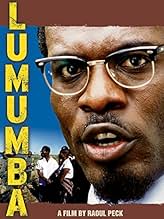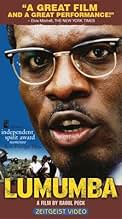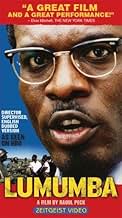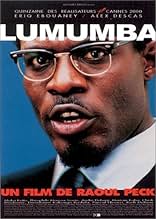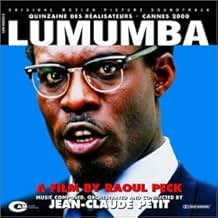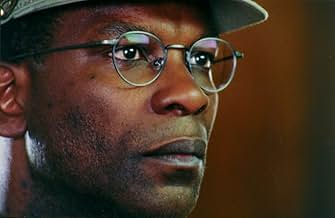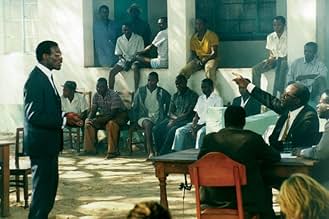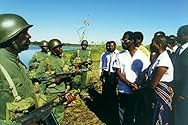Lumumba
- 2000
- Tous publics
- 1h 55m
IMDb RATING
7.2/10
2.2K
YOUR RATING
The true story of controversial leader of independent Congo Patrice Lumumba.The true story of controversial leader of independent Congo Patrice Lumumba.The true story of controversial leader of independent Congo Patrice Lumumba.
- Director
- Writers
- Stars
- Awards
- 3 wins & 8 nominations total
Théophile Sowié
- Maurice Mpolo
- (as Théophile Moussa Sowie)
Makena Diop
- Thomas Kanza
- (as Oumar Diop Makena)
Dieudonné Kabongo
- Godefroid Munungo
- (as Dieudonné Kabongo Bashila)
Pascal N'Zonzi
- Moïse Tshombe
- (as Pascal Nzonzi)
- Director
- Writers
- All cast & crew
- Production, box office & more at IMDbPro
Featured reviews
Wow. What a fabulous film. The artists are to be congratulated and thanked for making this whole era come to life.
Should you go to this movie? Well, my wife didn't want to go because she guessed that it would be upsetting. She was correct: It IS deeply upsetting to see cruelty, treachery, panic, wobbly social institutions, etc.
On the other hand, there's nothing like a strong dose of the truth. I don't know enough Congolese history to have an opinion on the accuracy of this tale, but the movie certainly had an emotional truth to it.
In fact, it reminded me of something Meryl Streep once said. She mentioned that the purpose of a movie is to tell you what it felt like to be there -- wherever "there" might happen to be. By that standard, this movie succeeded. The film showed me -- a white guy from an American suburb -- what it means to have guts and commitment to high ideals during the most chaotic of times.
If that sounds intriguing to you, go see "Lumumba"!
Should you go to this movie? Well, my wife didn't want to go because she guessed that it would be upsetting. She was correct: It IS deeply upsetting to see cruelty, treachery, panic, wobbly social institutions, etc.
On the other hand, there's nothing like a strong dose of the truth. I don't know enough Congolese history to have an opinion on the accuracy of this tale, but the movie certainly had an emotional truth to it.
In fact, it reminded me of something Meryl Streep once said. She mentioned that the purpose of a movie is to tell you what it felt like to be there -- wherever "there" might happen to be. By that standard, this movie succeeded. The film showed me -- a white guy from an American suburb -- what it means to have guts and commitment to high ideals during the most chaotic of times.
If that sounds intriguing to you, go see "Lumumba"!
This movie was intended to explore the powers that resisted and ultimately ended Lumumba's political movement in the Congo with historical accuracy. Although it goes to great lengths to meet that end, it falls horribly short in two major ways. One, the CIA is mentioned just one time. Two, JFK is portrayed as though he authorized Mubutu's "offer" of a military takeover. This is despite the fact that Lumumba was killed three days before JFK became president! With the information now available (read JFK: Ordeal in Africa by Richard Mahoney), there is no doubt that the Dulles brothers using the CIA were chiefly responsible for Lumumba's assassination. Kennedy was heartbroken by the news and understood and advocated for a united Congo much like Lumumba did, opposing Eisenhower and the CIA. Not to mention the Belgians and British. Although one could argue these points do not have a major impact on the movie, they are critical to understanding not just the Congo during that period, but the intense internal conflict in the United States between large interests (Wall Street represented by CIA) and JFK's vision for the world (third world independence and development, anti-imperialism).
I feel very fortunate to have the chance to not only watch this film, but also learn more about this fascinating person and time. Lumumba is an outstanding portrayal, giving a full sense of the story without falling into the usual Hollywood trappings - yes, he is shown with his wife and children, but the essence of the story is his politics and those of the still-emerging independent Congo. The film is brilliantly made, moving along at a pace that is consistently engaging. I look forward to seeing other Raoul Peck films, as well as more from Eric Ebouaney!
I just saw this movie last night, 2/21/02, on HBO TV in New York and noticed a fascinating and rare bit of censorship within it. In one late scene in the movie when Congo politicians and 1-2 Americans meet around table and vote whether Lumumba is to be captured/killed, the apparent American, perhaps a CIA officer, is addressed by Gen. Mobutu and asked how he wants to vote. But the American's name uttered by Mobutu is bleeped out in the televised version I saw and heard. Then in the film's final credits, this same character's name is masked over and appears only as "Mr......" played by actor Dennis Thatcher. So what IS the name of the mysterious man, no doubt too accurately identified, in this movie, airing on American TV some 2 years after it was made.
I was a pre-teen when news of Lumumba's assassination hit the news so I very vaguely recall at the time it was sad a leader who tried to shuck the reigns of colonialization was killed for efforts towards independence.
There is woefully insufficient time in a 2 hour movie to completely explain the whos whys and wherefores of a political assassination. Suffice to say the victors write the history and even if the truth were portrayed adequately, who's truth would it be? As the character Lumumba says in the movie, he came 50 years too early.
I found the story fast paced with good production values. It mirrored the all too brief time in power for a promising African leader, and there is a dearth of them lately. That continent still suffers a vacuum in its leadership, a state that will take another century to rectify. The film and life of Lumumba is a lesson of how badly things can go wrong in a climate of conflicting objectives and numerous parties and forces acting in a volatile setting. Congo had just gained independence and tribal rivalry reared its head very quickly. It is suggested for example that Lumumba seek sanctuary in the province of Katanga, where months before he had been refused landing rights in a flight to visit the troubled area. Politics makes strange bedfellows.
The time of the 1960s was the height of the cold war and Lumumba's courting of Soviet aid to fast track his country did not win any favours. No doubt the superpower USA had at least some hand in his death, much the same as Ngo Dhin Diem in Vietnam around the same time. Attempts to assassinate Fidel Castro at that time are also well documented so it may be some measure of just desserts that Kennedy met his end with an assassin's bullet.
Read up on that period of history then watch the movie to get additional value for the time you invest, and then you will be prepared to better understand contemporary events in far off places when national interests are at stake. Oil, diamonds, bauxite, coffee, whatever; liberty always seems to take a back seat when these interests get the ear of the powers that be.
Realism in the film is reinforced with the french dialog. I also understood the subtleties having studied military coups in university under a black professor who came from Nigeria.
There is woefully insufficient time in a 2 hour movie to completely explain the whos whys and wherefores of a political assassination. Suffice to say the victors write the history and even if the truth were portrayed adequately, who's truth would it be? As the character Lumumba says in the movie, he came 50 years too early.
I found the story fast paced with good production values. It mirrored the all too brief time in power for a promising African leader, and there is a dearth of them lately. That continent still suffers a vacuum in its leadership, a state that will take another century to rectify. The film and life of Lumumba is a lesson of how badly things can go wrong in a climate of conflicting objectives and numerous parties and forces acting in a volatile setting. Congo had just gained independence and tribal rivalry reared its head very quickly. It is suggested for example that Lumumba seek sanctuary in the province of Katanga, where months before he had been refused landing rights in a flight to visit the troubled area. Politics makes strange bedfellows.
The time of the 1960s was the height of the cold war and Lumumba's courting of Soviet aid to fast track his country did not win any favours. No doubt the superpower USA had at least some hand in his death, much the same as Ngo Dhin Diem in Vietnam around the same time. Attempts to assassinate Fidel Castro at that time are also well documented so it may be some measure of just desserts that Kennedy met his end with an assassin's bullet.
Read up on that period of history then watch the movie to get additional value for the time you invest, and then you will be prepared to better understand contemporary events in far off places when national interests are at stake. Oil, diamonds, bauxite, coffee, whatever; liberty always seems to take a back seat when these interests get the ear of the powers that be.
Realism in the film is reinforced with the french dialog. I also understood the subtleties having studied military coups in university under a black professor who came from Nigeria.
Did you know
- TriviaRaoul Peck had already made a film about Lumumba in 1992: the documentary Lumumba: La mort du prophète (1991).
- GoofsWhen Lumumba arrives at Brussels airport for a round table conference, an Airbus A300 and Lockheed C-141 Starlifter can clearly be seen. Both of these aircraft had not yet entered into service and flown at the time the event took place in 1960. Airbus A300 made its first flight on 28 October 1972, twelve years later; and Lockheed C-141 Starlifter made its first flight on 17 December 1963, three years after the conference.
- Quotes
[first lines]
Patrice Émery Lumumba: [voice over narration] You never knew about that night in Katanga. No one was to know.
- Alternate versionsFrank Carlucci, who was second secretary at the U.S. embassy in the Congo at the time of Lumumba's assassination, is portrayed in one scene discussing the murder with U.S. Ambassador Clare Timberlake and several Belgian and Congolese officials. Carlucci threatened to sue U.S. distributor Zeitgeist Films if his name was not removed from the movie. Zeitgeist was too small to fight any potential lawsuit, so all non-theatrical U.S. releases of the film (including the version shown on HBO and potential VHS and DVD releases) have Carlucci's name bleeped from the dialogue and masked in the closing credits.
- ConnectionsFeatured in Exterminez toutes ces brutes: Who the F*** is Columbus? (2021)
- How long is Lumumba?Powered by Alexa
Details
Box office
- Gross US & Canada
- $352,296
- Gross worldwide
- $352,296
- Runtime
- 1h 55m(115 min)
- Sound mix
Contribute to this page
Suggest an edit or add missing content


